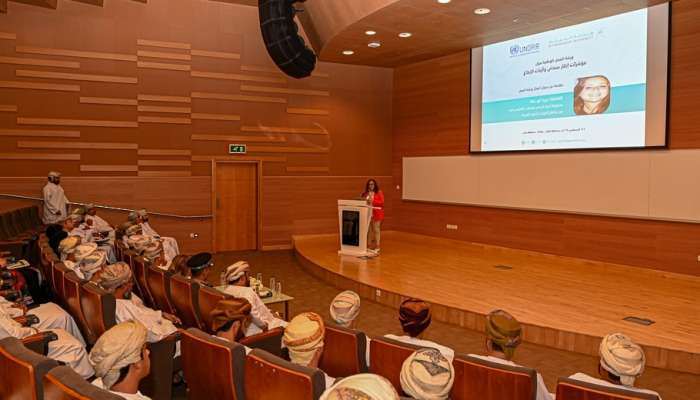
Salalah: A two-day workshop titled “Risk and Disaster Reduction” kicked off at Sultan Qaboos Youth Compound for Culture and Entertainment in Salalah on Wednesday.
The workshop is organised by the Environment Authority in cooperation with the United Nations Office for Disaster Risk Reduction (UNDRR)’s Regional Office for Arab States.
The opening ceremony was held under the auspices of Dr. Abdullah Ali Al Amri, Chairman of the Environment Authority, and attended by a number of experts and specialists from the Sultanate of Oman and abroad.
The workshop aims to enable national cadres to understand the global framework on diminishing the scope of natural disaster risks, as well as standard mechanisms for monitoring and reporting the progress made in implementing the objectives of the global framework.
It includes presentations, interactive discussions and practical training on using the global system of reporting, besides highlighting the role of institutional governance in this field.
Speaking at the workshop, Mamdouh Salim Al Marhoon, Director of the Environmental Emergency Center, said, “The Sultanate of Oman is aware of the escalating challenges associated with climate change and its geographical nature. This requires the development of an integrated national system to mitigate risks, based on knowledge, proactive planning and integration among different stakeholders.”
Al Marhoon affirmed Oman’s commitment to implement the requirements of the Sendai Framework for Disaster Risk Reduction 2015-2030.
He said that this commitment is realised by adopting decisions based on accurate data, in addition to building sustainable capacities that enhance preparedness and diminish the impact of disasters on people and the environment.
For her part, Noura Al Ashqar, Head of the UNDRR’s Regional Office for Arab States, said, “The Sultanate of Oman is making tangible progress toward enhancing resilience by integrating the concept of risk reduction into national policies and plans, in addition to the use of data and information in a manner that supports decision-making amid rising environmental challenges facing the region.”
The opening session of the workshop included a visual presentation on the Sendai Framework, in addition to an outline of the agenda of the workshop that was presented by Mirna Abu Ata, Programme Management Officer at the UNDRR.
The workshop also discusses the definition of the Sendai Framework, its goals, indicators, terminology and the extent to which the Sendai Framework is related to Sustainable Development Goals (SDGs). It also deals with the global reporting system, data classification mechanisms and periodic reporting.
Being the leading global reference in this field, the Sendai Framework for Disaster Risk Reduction 2015-2030 seeks to limit human, material and service losses, enhance the understanding and management of risks and encourage capacity building, disaster preparedness and response to disasters when they occur.
The Sendai Framework comprises seven global goals and 38 indicators to measure progress. Member states are committed to submit periodic reports via an approved electronic platform.